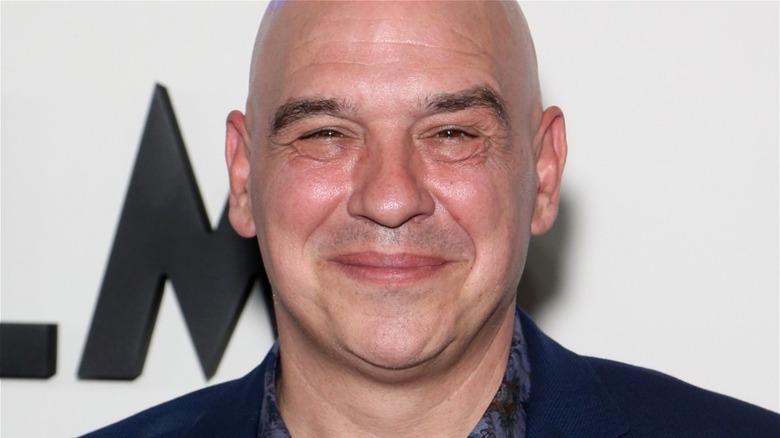Michael Symon Weighed In On A Huge Debate About Cooking Shows
This week in the Wall Street Journal, sports columnist Jason Gay declared that Hulu's "The Bear" is "the best sports show on TV." With the exception of a Blackhawks jersey that hangs behind the counter and a few references to pro baseball player Minnie Minoso, the show is not about sports in the traditional sense. Rather, it's about Carmy, a brilliant-yet-tortured Michelin-trained hot chef who leaves his fancy New York kitchen to take over his deceased brother's chaotic Chicago sandwich joint.
Gay's statement rehashes a years-long debate that may have sprung from a 2009 New York Times Magazine cover story by Michael Pollan. It goes like this: Should cooking shows, like the ones on Food Network, be presented as a sport, an art form, or somewhere in between? "'The Bear' lands like a sports show because it's a tribute to teamwork," writes Gay. "Not the kind that happens on the field, but in a narrow kitchen with a comparable alignment of personalities." Indeed, Carmy and his staff often move around the kitchen with the speed and resilience of pro tennis players. As the sports vs. art debate reenters the discourse, celebrity chef Michael Symon took to Twitter to share his thoughts.
Symon is playing devil's advocate
"Remember when Food Network had so many great teaching shows instead of the crappy competition shows?" griped "Jeopardy!" champion Christine Valada on Twitter this week. "Food as sport is not inspiring." Celebrity chef Michael Symon had a simple, measured response to this complaint: "I like both." The former "Throwdown" host proceeded to dedicate his evening to the debate, dropping a second Twitter response that called cooking "both" a sport and an art. He cited the IKA culinary Olympics and culinary school competitions, assuring skeptics that competitive cooking is "actually very common."
Given more time, Symon may also have referenced the year American chefs made history by winning the Bocuse d'Or — a prestigious French cooking competition named after the late French chef Paul Bocuse — for the first time ever (via The Washington Post). Symon later added that cooking competition shows "come closer than anything else to recreating the intensity of a restaurant kitchen [...] just with less special orders!!!!"
The blurred line between art and competition may extend beyond cooking shows, which in a way bolsters Symon's point. Many jersey-clad fans might agree with philosopher Ruth L. Saw, one of the first in her field to draw a parallel between sports and art. In this regard, one could argue that all forms of competition have more to offer than just entertainment value.

